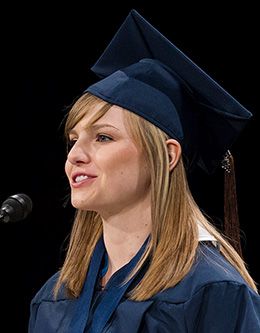Congratulations, graduates. As we gather here this afternoon, I’m sure you are filled with thanks, as I am, to be in this unique setting with our faculty, family, and friends, and especially President Samuelson and Elder Scott. Indeed, we are the beneficiaries of a great educational inheritance. Graduating from BYU means continuing a legacy of learning established over a century ago.
As we reflect on our accomplishments today, it is only fitting to acknowledge those who have provided us the scaffolding upon which we have built our personal houses of learning.
For the past several years we have been in an environment that catered to our learning. What a privilege! We were able to spend hours in studios and study rooms, on stages and in laboratories, and maybe even abroad, in environments structured to suit our needs as learners. Lectures were prepared to help us grow. Various guests, professionals in their fields, were brought in to further enrich our learning environments with perspective and expertise. We have truly had a world-class education here at BYU.
In a sense, the educational feast was laid out before us, and all we had to do was show up at the table.
As an art student, much of my work centered on my family history. As I learned more about my ancestors’ lives, I came to realize that I am part of a unique succession of individuals who value learning. I’d like to share two examples of individuals who have gone before and sacrificed to provide supportive scaffolding for my education, as well as for that of my children.
My great-grandmother, Helene Ottinger, though barely scraping by on the combined wages of her widowed mother and husbandless grandmother, graduated at the top of her high school class and attended college on a one-year scholarship. However, when the money ran out, so did Helene’s opportunity to study formally. Helene knew the importance of an education, and—though never able to receive her own degree—she made sure that my grandfather became a scholar. My grandfather, in turn, has instilled in his children and grandchildren a love of learning and discovery that has served all of us well throughout our lives.
My daughter is named for her third great-grandmother, Ada Robinson. Though she was never formally schooled, her grandchildren describe Ada as one who loved learning. They recall visiting Grandma Ada on her farm in Fillmore, Utah. Not only were their days spent riding horses, but Ada would also fill their visits with books and learning. The books were piled high on the counters in the kitchen and adorned the end tables in the living room. She literally altered the environment of her home by filling it with tools for discovery.
These stories remind me that despite the honor it is to receive this formal degree, so much of that achievement is a natural outgrowth of the advantages I have had that my ancestors did not.
We are all beneficiaries of the support from family, friends, faculty, and the generous tithes of faithful Church members. This support has aided us as we have studied in rich learning environments. But what happens when we leave BYU—when the walls of our classrooms that enclosed us in knowledge-acquiring spaces fall away and we’re left without a campus, without professors, and without this formal scaffolding of learning that structured our education? How do we then structure our surroundings so we can continue to excel?
Hopefully, while listening in lectures, attending presentations, researching, writing, and creating, we have come away with a method of learning that is portable and personal. Hopefully we will take with us the ability to continue to learn, even when the scaffolding that held us up here has fallen away.
I have had a taste of this challenge as I finished up my last few credits from home this semester. After having a baby in February, I moved from spending close to forty hours weekly in my studio on campus to feeling lucky if I could string together forty consecutive minutes to work on homework. I was no longer surrounded by creators and scholars; instead, my new study companion became a rather needy newborn.
During this time when the scaffolding of formal education had fallen away, I drew strength from my ancestors. They had created their own learning environments independent from the formal constructs of a university. I realized that I could too, and with my ancestors’ examples in mind, I continue striving toward this goal.
It is my conviction that we have not only acquired the tools to write papers, solve equations, make paintings, or perform on a stage, but we have acquired the tools and know-how to create environments of learning. This skill will become increasingly important as we become leaders who are charged with helping others learn.
Fellow graduates, let us be grateful for our educational inheritances, for our scaffolding, and for our houses of learning. But let us also be forward looking as we go forth to serve and continue to create environments of learning for ourselves and for others. Thank you.
© Brigham Young University. All rights reserved.

Paige Crosland Anderson spoke as the representative of her graduating class at BYU commencement on 21 April 2011.


